|
|
|
Sort Order |
|
|
|
Items / Page
|
|
|
|
|
|
|
| Srl | Item |
| 1 |
ID:
082058
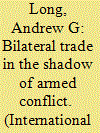

|
|
|
|
|
| Publication |
2008.
|
| Summary/Abstract |
Does the shadow of war decrease trade? I examine the influence of conflict on bilateral trade and argue that trading firms' expectations of armed conflict, both within and between nation-states, should decrease trade along with armed political violence. By assuming that firms care about future profits and assess the likelihood of a domestic or interstate conflict in the future that could disrupt trade, I argue that increasing the expectation of a domestic or interstate conflict raises the transportation, transaction, and production costs of trade. Empirically, contemporaneous trade levels should be negatively related to trading firms' beliefs about the likelihood of domestic and interstate conflicts in the future. Statistical tests, using bilateral trade data from 1984 to 1997, show that expectations of domestic or interstate conflict, in addition to violent armed conflicts, are negatively correlated with bilateral trade levels. Theoretically and empirically, this research advances our understanding of the trade-conflict relationship by demonstrating how trading firms' expectations about future conflict reduce bilateral trade levels
|
|
|
|
|
|
|
|
|
|
|
|
|
|
|
|
| 2 |
ID:
082059
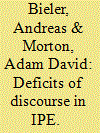

|
|
|
|
|
| Publication |
2008.
|
| Summary/Abstract |
This article engages with the debate on how the role of ideas can be conceptualized within International Relations (IR) and International Political Economy (IPE) and how this is related to the discursive production of meanings embedded in the economy. It is argued that although constructivist and poststructuralist approaches can conceptualize the structural relevance of ideas, thereby improving on neorealist and liberal institutionalist approaches, they nevertheless fail to explain why certain ideas dominate over others at a particular moment in time. In response to constructivist and poststructuralist criticism, it is argued that the internal relation of ideas as material social processes is appreciated better through an historical materialist theory of history. In other words, the article shows how ideas can be conceived as material social processes through which signs become part of the socially created world in a way that surpasses the deficits of constructivist and poststructuralist approaches alike, whilst avoiding the problems of economism.
|
|
|
|
|
|
|
|
|
|
|
|
|
|
|
|
| 3 |
ID:
082056
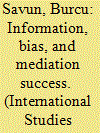

|
|
|
|
|
| Publication |
2008.
|
| Summary/Abstract |
Why do some mediation episodes produce successful negotiated settlements between the disputants of international conflict while others fail to achieve success? This article examines how certain characteristics of a mediator, that is, a mediator's information about the disputants and a mediator's bias toward them, affect the success of mediation of international conflicts. By drawing a conceptual distinction between absolute and relative bias and measuring the type of information that is relevant for mediation success, I demonstrate that both the degree of bias a mediator holds toward the disputants and the degree of information a mediator has about the disputants are significant predictors of mediation success
|
|
|
|
|
|
|
|
|
|
|
|
|
|
|
|
| 4 |
ID:
082057


|
|
|
|
|
| Publication |
2008.
|
| Summary/Abstract |
This article explores a perverse consequence of the emerging norm of humanitarian intervention, or "Responsibility to Protect," contrary to its intent of protecting civilians from genocide and ethnic cleansing. The root of the problem is that such genocidal violence often represents state retaliation against a substate group for rebellion (such as an armed secession) by some of its members. The emerging norm, by raising expectations of diplomatic and military intervention to protect these groups, unintentionally fosters rebellion by lowering its expected cost and increasing its likelihood of success. In practice, intervention does sometimes help rebels attain their political goals, but usually it is too late or inadequate to avert retaliation against civilians. Thus, the emerging norm resembles an imperfect insurance policy against genocidal violence. It creates moral hazard that encourages the excessively risky or fraudulent behavior of rebellion by members of groups that are vulnerable to genocidal retaliation, but it cannot fully protect against the backlash. The emerging norm thereby causes some genocidal violence that otherwise would not occur. Bosnia and Kosovo illustrate that in at least two recent cases the moral-hazard hypothesis explains why members of a vulnerable group rebelled and thereby triggered genocidal retaliation. The article concludes by exploring whether potential interveners could mitigate genocidal violence by modifying their intervention policies to reduce moral hazard
|
|
|
|
|
|
|
|
|
|
|
|
|
|
|
|
| 5 |
ID:
082061
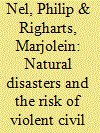

|
|
|
|
|
| Publication |
2008.
|
| Summary/Abstract |
Does the occurrence of a natural disaster such as an earthquake, volcanic eruption, tsunami, flood, hurricane, epidemic, heat wave, and/or plague increase the risk of violent civil conflict in a society? This study uses available data for 187 political units for the period 1950-2000 to systematically explore this question that has received remarkably little attention in the voluminous literature on civil war. We find that natural disasters significantly increase the risk of violent civil conflict both in the short and medium term, specifically in low- and middle-income countries that have intermediate to high levels of inequality, mixed political regimes, and sluggish economic growth. Rapid-onset disasters related to geology and climate pose the highest overall risk, but different dynamics apply to minor as compared to major conflicts. The findings are robust in terms of the use of different dependent and independent variables, and a variety of model specifications. Given the likelihood that rapid climate change will increase the incidence of some types of natural disasters, more attention should be given to mitigating the social and political risks posed by these cataclysmic events
|
|
|
|
|
|
|
|
|
|
|
|
|
|
|
|
| 6 |
ID:
082060


|
|
|
|
|
| Publication |
2008.
|
| Summary/Abstract |
Beginning in the mid-1980s, in the absence of active encouragement from the IMF's management or member states, the staff began to encourage the liberalization of capital controls as a norm. This behavior constitutes a puzzle for the conventional wisdom, which sees the "Wall Street-Treasury Complex" as responsible for the IMF's approach, as well as a blind spot for rationalist approaches, which offer little insight into processes that shape preference formation "from within" international organizations (IOs). In a context where the Fund's member states permitted the staff considerable discretion and autonomy, I argue the staff's initial adoption of the norm of capital freedom was largely shaped by three internal processes: administrative recruitment, adaptation, and learning. But norm adoption did not mean the end of internal discussion, and a vigorous debate emerged between "gradualists" and supporters of the "big bang" over how the norm should be interpreted and applied. In this "battle of ideas," I emphasize the critical role of internal entrepreneurship
|
|
|
|
|
|
|
|
|
|
|
|
|
|
|
|
| 7 |
ID:
082055
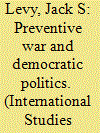

|
|
|
|
|
| Publication |
2008.
|
| Summary/Abstract |
define the concept of preventive war, distinguish it from preemption and other sources of better-now-than-later logic, and examine numerous conceptual issues that confound theoretical and empirical analyses of prevention. I then consider the argument that democracies rarely if ever adopt preventive war strategies because such strategies are contrary to the preferences of democratic publics and to the values and identities of democratic states. I examine a number of historical cases of anticipated power shifts by democratic states, and analyze the motivations for war and the mobilization of public support for war. The evidence contradicts both the descriptive proposition that democracies do not adopt preventive war strategies and causal propositions about the constraining effects of democratic institutions and democratic political cultures.
|
|
|
|
|
|
|
|
|
|
|
|
|
|
|
|
| 8 |
ID:
082062


|
|
|
|
|
| Publication |
2008.
|
| Summary/Abstract |
The most commonly used weapon in the arsenal of human rights proponents is shaming the violating government through public criticism. But does this really affect the behavior of the violator? This study examines how governments that are targeted for human rights criticism respond to subsequent contentious challenges. Analyzing 873 challenges in seven Latin American countries between 1981 and 1995, it is found that human rights criticism does lead governments to reduce repression of subsequent challenges in cases where there are relatively strong economic ties to other countries. However, the duration of this impact is relatively short-less than 6 months. Examination of the source of human rights criticism shows that criticism by NGOs, religious groups, and foreign governments was more effective than criticism from inter-governmental organizations.
|
|
|
|
|
|
|
|
|
|
|
|
|
|
|
|
|
|
|
|
|